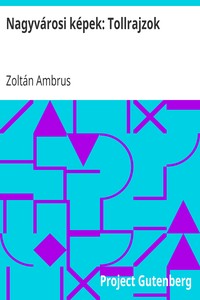Nagyvárosi képek: Tollrajzok by Zoltán Ambrus
"Nagyvárosi képek: Tollrajzok" by Zoltán Ambrus is a collection of literary sketches likely written during the early 20th century. The work captures the essence of urban life in Budapest, focusing on the juxtaposition between the bustling high society and the inner reflections of the narrator. Through vivid imagery and a philosophical lens, the book delves into themes of alienation and the search for meaning amidst the distractions of modern life. At the
start of the collection, the narrator finds himself at a horse race, surrounded by the thrill and excitement of the crowd, yet feels an internal disconnect. He contemplates the superficiality of the events unfolding around him and questions his own motivations for being there. This inner monologue reveals his struggle between the allure of societal pleasures and his own melancholic introspection, ultimately highlighting his awareness of the fleeting nature of joy and the serenity found in the simple pleasures of life. As he observes the horses and the people, he reflects on deeper existential questions, setting the tone for the philosophical explorations that will continue throughout the work. (This is an automatically generated summary.)
Read or download for free
| How to read | Url | Size | |||
|---|---|---|---|---|---|
| Read now! | https://www.gutenberg.org/ebooks/64580.html.images | 535 kB | |||
| EPUB3 (E-readers incl. Send-to-Kindle) | https://www.gutenberg.org/ebooks/64580.epub3.images | 360 kB | |||
| EPUB (older E-readers) | https://www.gutenberg.org/ebooks/64580.epub.images | 358 kB | |||
| EPUB (no images, older E-readers) | https://www.gutenberg.org/ebooks/64580.epub.noimages | 336 kB | |||
| Kindle | https://www.gutenberg.org/ebooks/64580.kf8.images | 599 kB | |||
| older Kindles | https://www.gutenberg.org/ebooks/64580.kindle.images | 541 kB | |||
| Plain Text UTF-8 | https://www.gutenberg.org/ebooks/64580.txt.utf-8 | 491 kB | |||
| Download HTML (zip) | https://www.gutenberg.org/cache/epub/64580/pg64580-h.zip | 294 kB | |||
| There may be more files related to this item. | |||||
Similar Books
About this eBook
| Author | Ambrus, Zoltán, 1861-1932 |
|---|---|
| Title | Nagyvárosi képek: Tollrajzok |
| Note | Reading ease score: 63.6 (8th & 9th grade). Neither easy nor difficult to read. |
| Contents | Lóversenyen -- Kis fiuk, kis leányok -- Aszfalt Betti -- Az elátkozott fü -- Becsületének orvosa -- Őszi kontemplácziók -- Twistek -- Nagyszombat -- A pengő ércz és a zengő czimbalom -- A szinkörök pszihologiája -- Farsang -- Utazás Budapest körül -- Regénytárgyak -- Fázódások -- A gerolsteini herczeg naplója -- Az ujkor alkimistái -- Lóverseny-alakok -- Nemzetünk barátja -- Szélmalomharczok -- Selyem és rongy -- Szentimentális séta -- Bálozás -- Bőjti prédikáczió -- Tavasz -- A premiére-ek közönsége -- Operabálon -- Nyári mulatságok -- Budapest világváros -- Az arénában -- Sylvana -- -298- -- Diákhalál -- Rose Pompon -- Kilencz krajczár -- A maharadzsák -- Jubileum -- Georges -- A szerencse-malacz -- Automobil-banket -- A fehér szegfü -- A lófejü szörny -- Worth -- Sic itur ad Astra -- A budapesti Grand Café Parisien-ben. |
| Credits | Albert László from page images generously made available by the HathiTrust Digital Library |
| Language | Hungarian |
| LoC Class | PH: Language and Literatures: Finno-Ugrian and Basque languages and literatures |
| Subject | Hungarian literature |
| Category | Text |
| EBook-No. | 64580 |
| Release Date | Feb 17, 2021 |
| Copyright Status | Public domain in the USA. |
| Downloads | 200 downloads in the last 30 days. |
| Project Gutenberg eBooks are always free! | |


